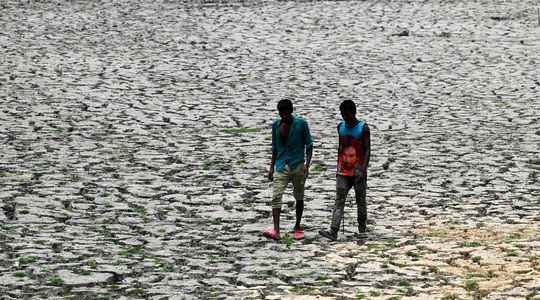The few observations make you dizzy: increase in mortality linked to heat waves, greater risk of infectious diseases, food security crisis… Climate change directly affects global health, according to a new report from the scientific journal TeaLancet. Through a list of several indicators, the authors of the study precisely show the effects of climate change on our health and, a few weeks before COP27, call for a radical change in our lifestyles to put health back at the heart of the ecological transition.
One of the first aspects of climate change is the increase in heat waves. With its direct consequences. Thus the report shows that mortality linked to these increased by 68% between 2017 and 2021 compared to the period 2000-2004, and underlines that this mortality rate has been particularly exacerbated due to Covid. Heat waves have also led to more food insecurity. According The Lancet, 98 million additional people were in a situation of moderate to severe food insecurity in 2020 compared to the years 1981-2010, in 103 countries analyzed.
But this is not the only threat that awaits us. Changing climate and our environment due to human activities is accelerating the transmission of infectious diseases, “exposing populations to increased risk of emerging diseases and co-epidemics”. The probability of dengue fever transmission has thus increased by 12% between 2012 and 2021 compared to 1951-1960 and over this same period, the number of months favorable to malaria transmission has increased by 31.3% in the areas of high altitudes in North America, and 13.8% in these areas in Africa.
Weakened by the Covid pandemic
The impact of climate change is also economic. Exposure to such high heat led to the loss of 470 billion potential working hours worldwide in 2021, according to the authors. Separately, the report highlights that extreme weather events caused damages on the order of US$253 billion in 2021, particularly burdening people in low-income countries where almost none of these losses were insured.
“Our report this year reveals that we are at a turning point. We are seeing the severe health impacts of climate change around the world, while the continued global reliance on fossil fuels compounds these adverse health effects in a context multiple global crises,” says Marina Romanello, executive director of the Lancet Countdown at University College London.
The authors also insist on the weight of the Covid-19 pandemic on health systems, which have been put to the test all over the world, and further weaken our ability to deal with these issues related to climate change. “Health systems are the first line of defense in dealing with the physical and mental health impacts of extreme weather events and other effects of climate change. But these systems are struggling to manage the burden of the Covid-19 pandemic. , supply chain disruptions and other challenges, which puts lives at risk, now and in the future,” said Kristie Ebi, director of the Adaptation, Planning and Resilience Task Force for Lancet Countdown Health and Professor at the Center for Global Health and Environment at the University of Washington.
Europe’s responsibility
States must take urgent action to strengthen their health systems, explain these university scientists and UN agencies, and lower their consumption of fossil fuels, which directly threatens them. The report also points to the risk of maladaptation. For example, the number of homes equipped with air conditioning increased by 66% between 2000 and 2020, an inadequate response that is worsening the energy crisis and further increasing urban heat, air pollution and greenhouse gas emissions. greenhouse, the authors point out. Experts are calling for a health-focused response to this environmental and climate crisis. This would prevent climate change, and improve health, thanks to the co-benefits it provides.
For the first time, this report focused on Europe, and thus shows the discrepancy between the continent’s historical responsibility for the current warming, and its consequences for the most vulnerable countries. “Europe has always been one of the biggest contributors to the climate crisis, putting lives and health at risk globally. It is important to note that these impacts are felt unequally, exacerbating inequalities deeply rooted between and within countries Europe’s delayed response means that people are increasingly feeling the health effects of climate change, while missing out on the direct and indirect health benefits that ambitious climate action could deliver,” according to Kim van Daalen, lead author of the Lancet Countdown in Europe report and a PhD student at the University of Cambridge.
Good news
According to the authors of the report, solutions can be put in place to allow both the decarbonization of certain sectors and an improvement in living environments. “Improvements in air quality would help prevent the 1.2 million deaths from exposure to fine particulate matter derived from fossil fuels in 2020 alone.” Similarly, adapting to a different way of life can have co-benefits. As for meat consumption: “an accelerated transition to balanced and more plant-based diets would not only reduce 55% of emissions from the production of red meat and milk but also avoid up to 11.5 million diet-related deaths each year.
Finally, there is good news: the issue of health is increasingly present, politically and in the media. “Media coverage of health and climate change hit a new high in 2021, with a 27% increase from 2020.” And zero-carbon energy sources now represent 80% of investments in electricity production in 2021, a glimmer of hope to emerge from the top of this environmental crisis.
